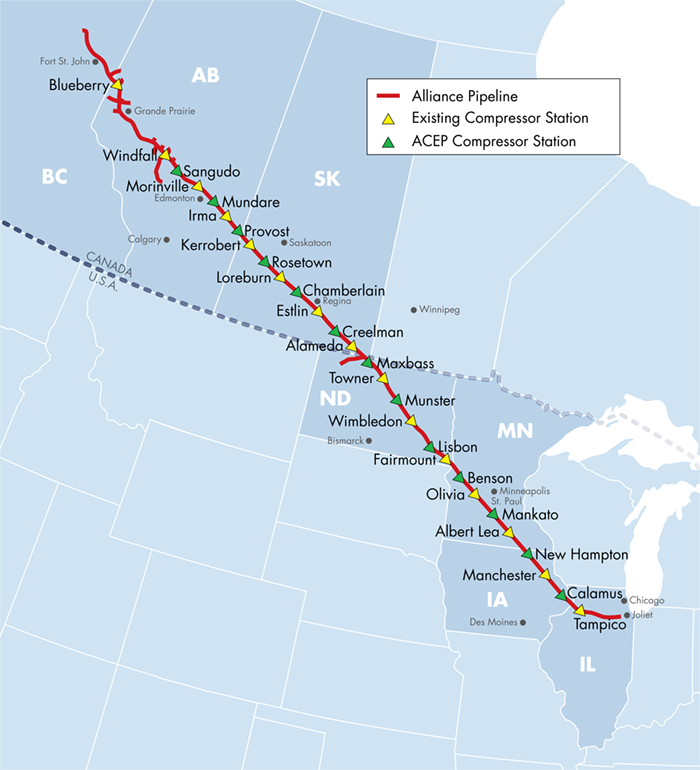As the keys on this keyboard were about to begin pecking out this editorial, a press release came in from the Government of Saskatchewan. Our province would be backing Alberta, introducing similar legislation to allow us to cut off British Columbia from energy exports, should we so choose.
The press release noted, “The bill responds to the inaction by the federal government to assert its jurisdictional authority to ensure the Trans Mountain Expansion Project proceeds.”
It’s a pressure tactic against British Columbia, whose NDP government has vowed to “use every tool in the toolbox” to stop the Kinder Morgan Trans Mountain Expansion Project. The continued delay of export pipeline construction has diminished our own province’s revenue to the tune of over $200 million per year, due to oil price differentials.
It’s a curious juxtaposition with another story going in this edition: the Alliance Pipeline is seeking to expand its capacity by 25 per cent. When that pipeline was built in 1999-2000, it was built with heavy-wall pipe from the outset. The pipeline was designed so that they could add additional compressor stations roughly halfway between each of its existing compressor stations, allowing the pipeline to boost its capacity without building any new pipe.
It was a very smart move on Alliance’s part (owned 50/50 by Enbridge and Pembina Pipeline). Who could have foretold, two decades ago, that new pipeline construction would have become such a toxic issue today?
They already own the land. They just need the approvals to go ahead. Since this planning would have obviously been in its initial application, it should be a slam dunk. They’re just doing what they said, 20 years ago, what they would eventually do.
So why does Alliance need the additional capacity? It’s been running at full steam, fueled presumably by the explosion of natural gas production in northeastern British Columbia. The destination of the Alliance Pipeline is Chicago, in other words, an export market. Alliance’s website even refers to it as the “premium U.S. Midwest market.”
Very Curious, it seems. British Columbia petroleum production is seeking export to a foreign market, and that gas would flow through Alberta and Saskatchewan. There seems to be something familiar about that.
Now what would happen if those two provinces, or even one, chose to use “every tool in the toolbox” to stymie this project? What if municipalities got their knickers in a knot regarding municipal bylaws on the cutting down of trees? (Not that you’re going to find many trees near Rosetown, Chamberlain or Creelman, where the additional compressor stations are to be built.)
Maybe Saskatchewan could require environmental assessments counting every blade of grass on those sites. There could be endangered burrowing gophers on each of these sites! What a travesty if a gopher were to be disturbed. We might have to tranquilize and relocate each and every one of them to gopher sanctuaries, built at the proponent’s expense and maintained in perpetuity.
While we study gopher habitat, the province of British Columbia could cool its heels for years on end, with no end in sight, foregoing hundreds of millions of dollars in royalty revenues and billions of dollars in economic activity at their end of the pipe. Maybe, if they get desperate enough, the Government of British Columbia will feel it’s necessary to buy into the Alliance Pipeline, just to show how serious they are.
Never mind that the construction of these three new compressor stations in Saskatchewan, plus work on the four existing ones, would result in hundreds of millions of dollars of work, plus additional, permanent jobs at those new stations.
You see, British Columbia depends on Alberta and Saskatchewan to get its products to foreign markets just as we depend on them to host our West Coast ports and the rail, pipeline and road conduits to them. They need us, just like we need them. Some people might call it an “economic union,” but that’s so 19th century.
As we try to strangle each other economically, no one gains. We will all suffer. What’s next? B.C. Wine? Wheat and potash? Forestry products? When will it end?
Energy and Resources Minister Bronwyn Eyre told us, “We didn’t want to be here. We take being here very seriously.”
Pressed on whether the province would use this legislation in terms of the Alliance Pipeline, she said, “I don’t want to get ahead of myself, nor does the government.
“Obviously this could arise as an issue, but we don’t hope it comes to that.”
Noting that our provincial interest is what drives this, including more than $200 million in royalties revenuest to the Western Canada Select/West Texas Intermediate differential, she added, “We don’t want to hurt anyone.”
Got that, B.C.?




